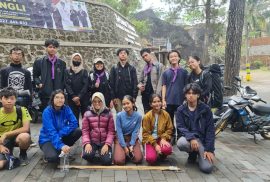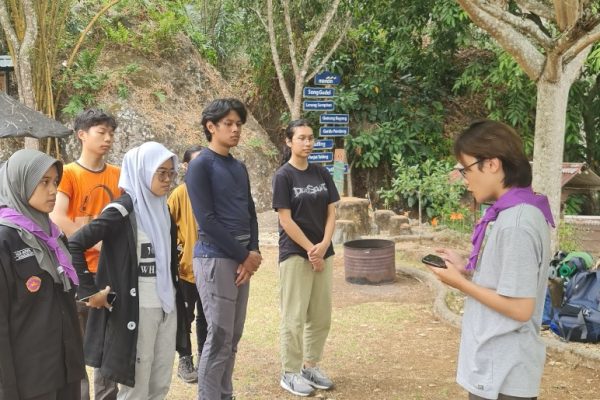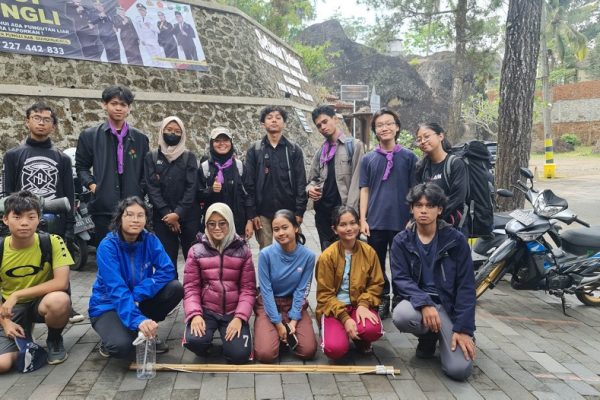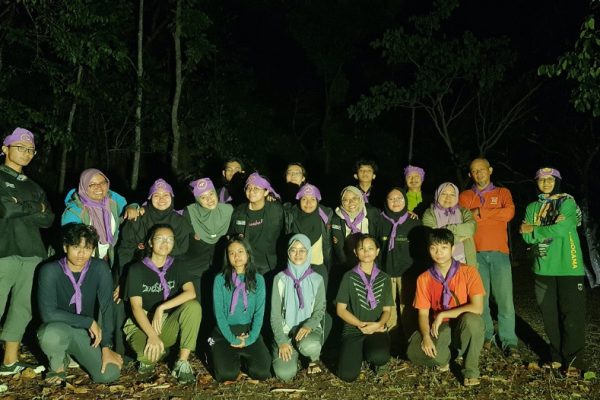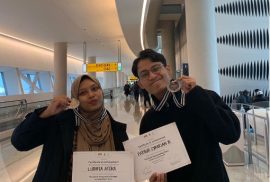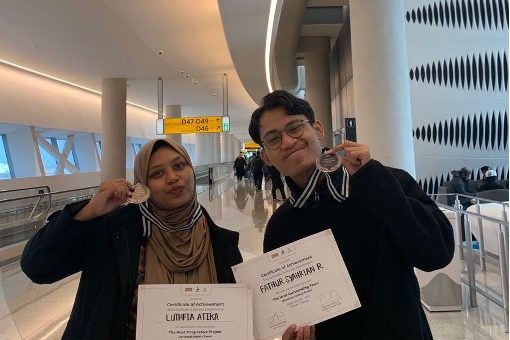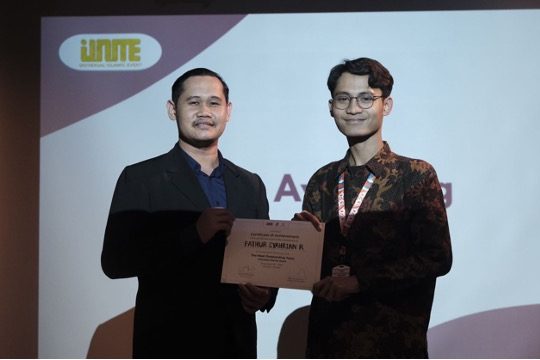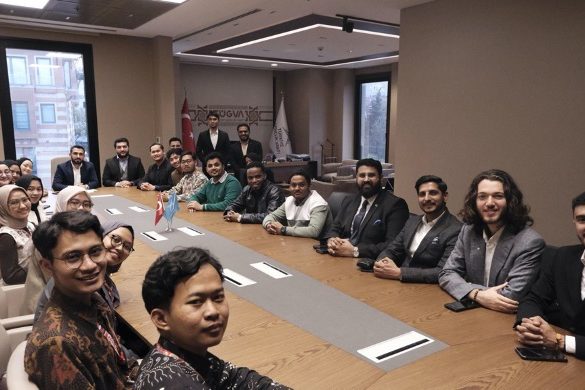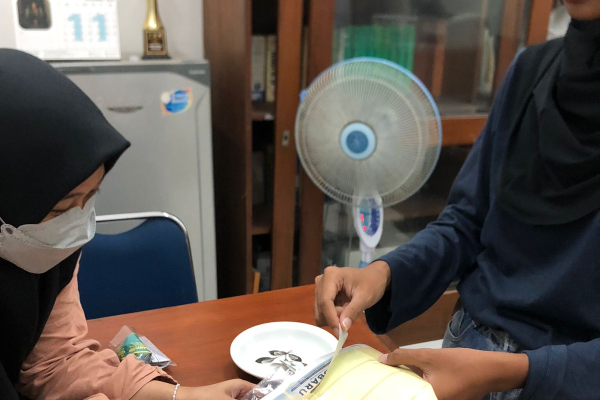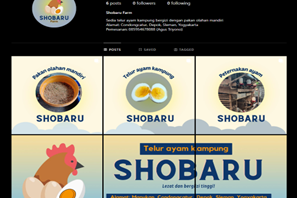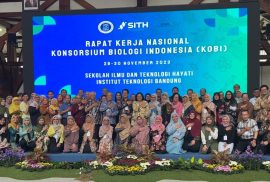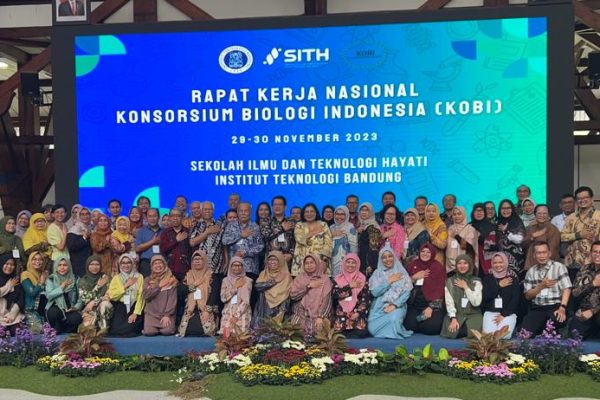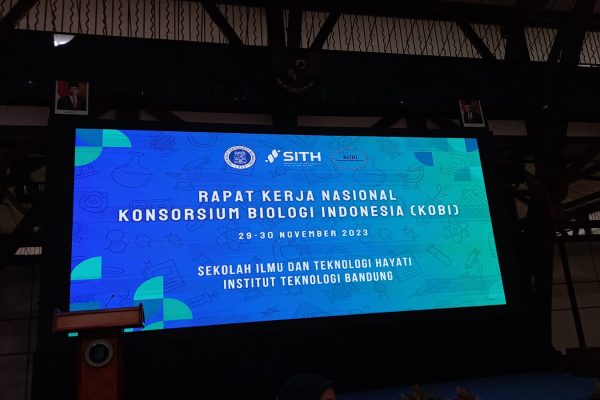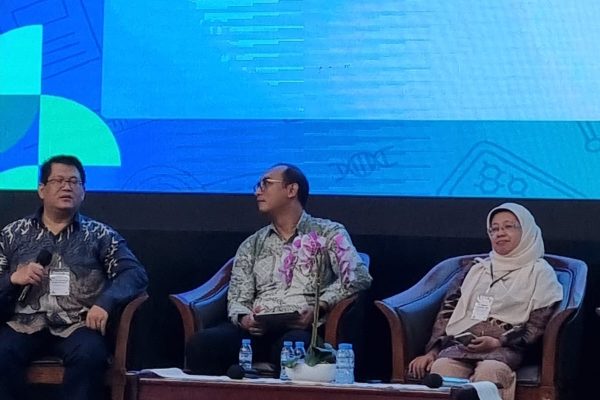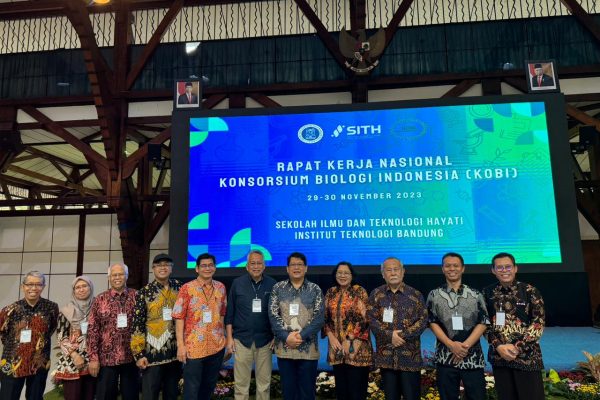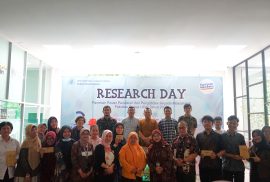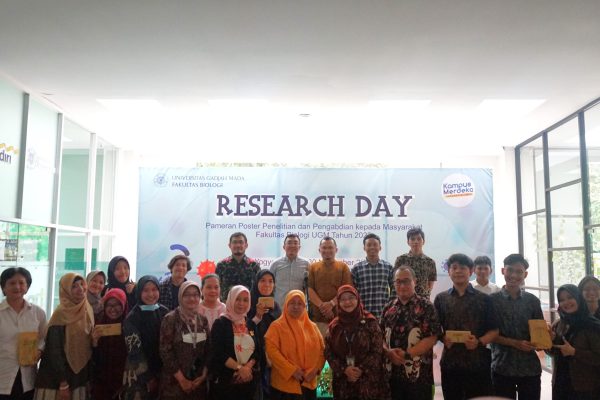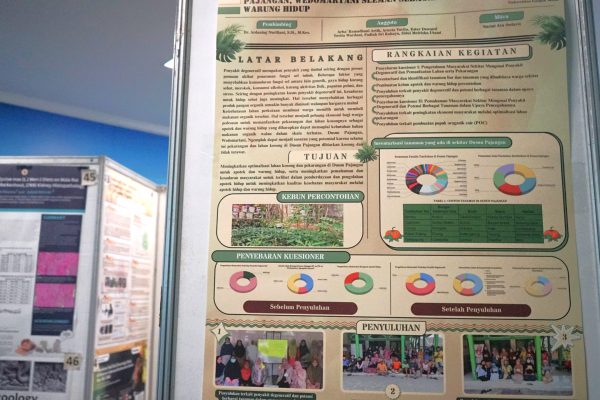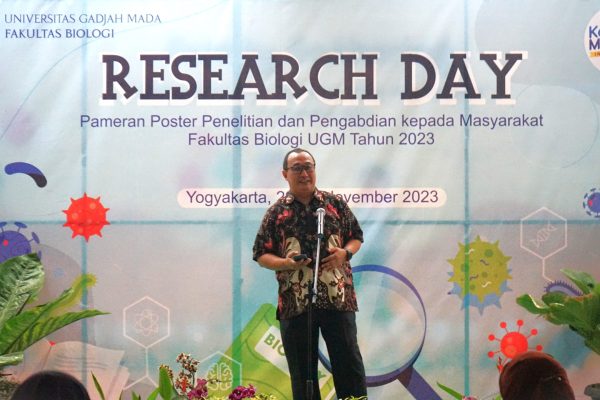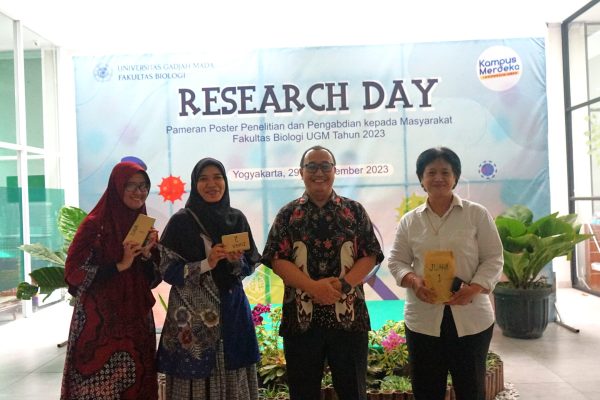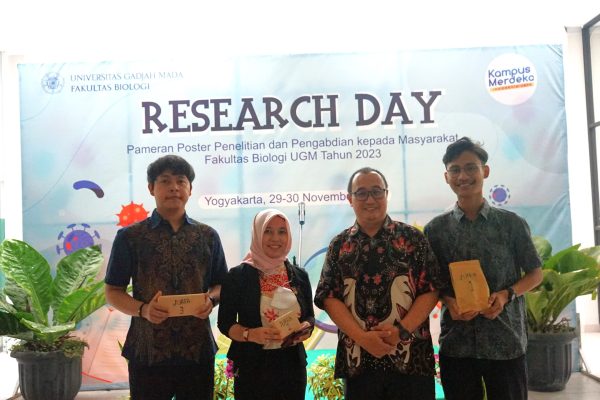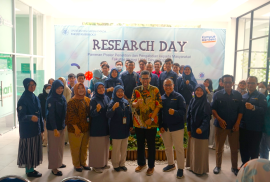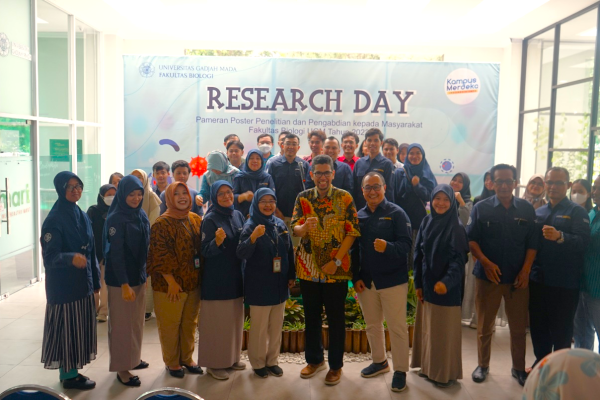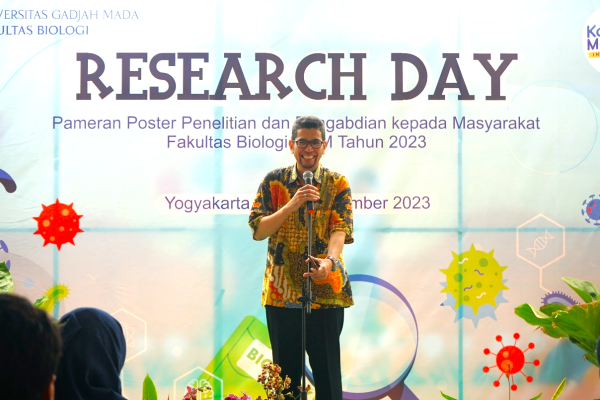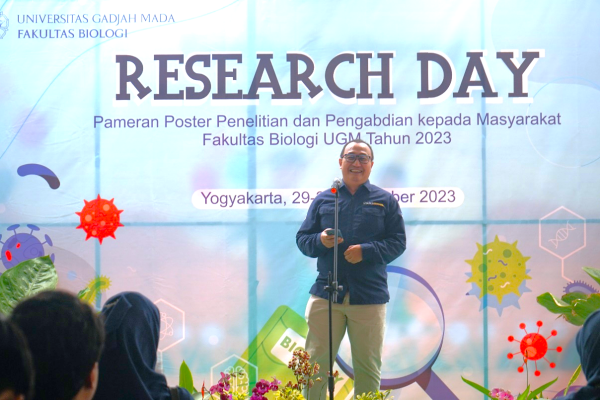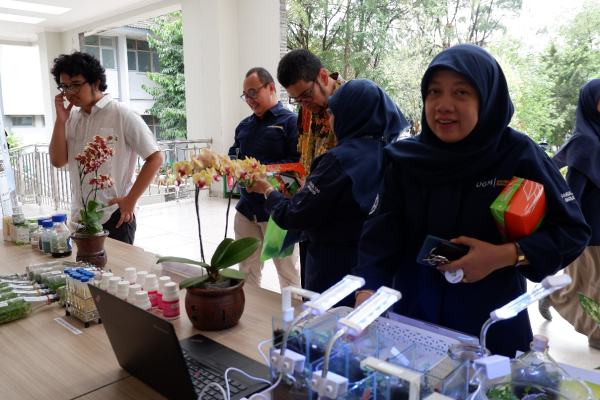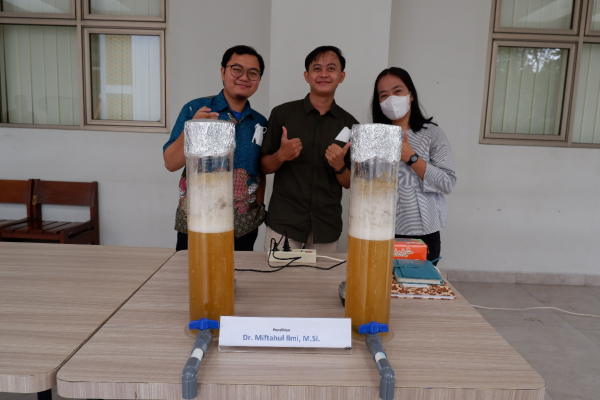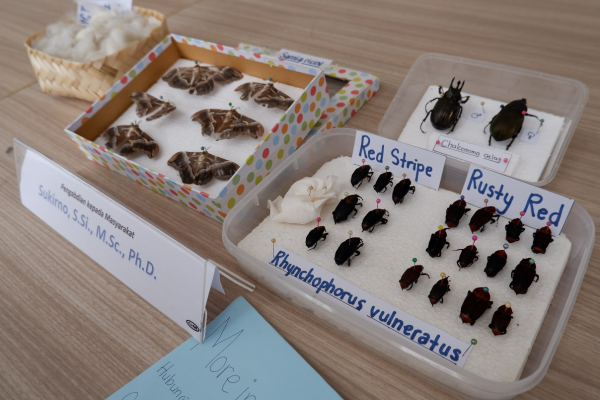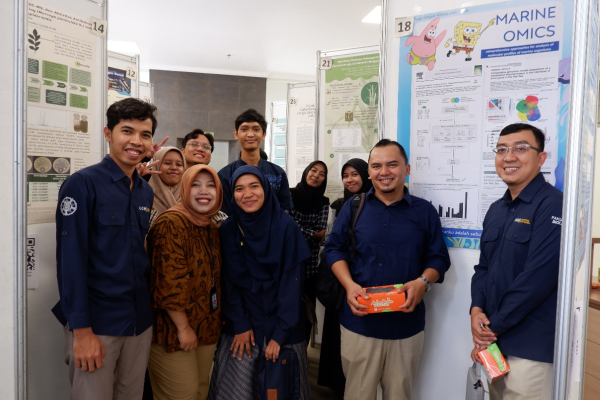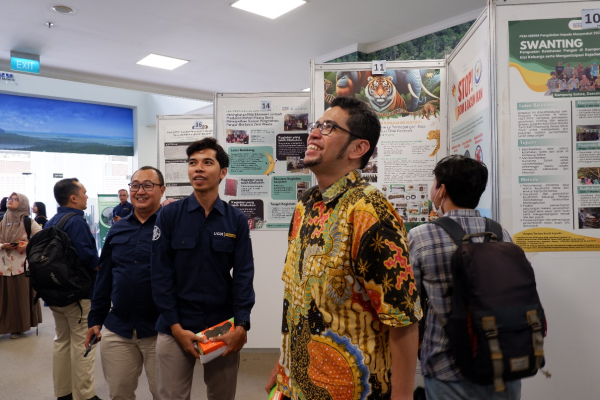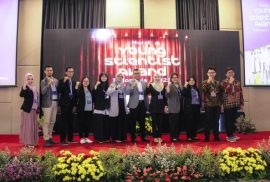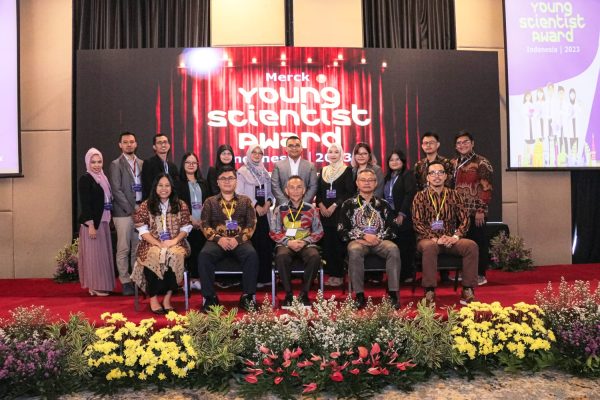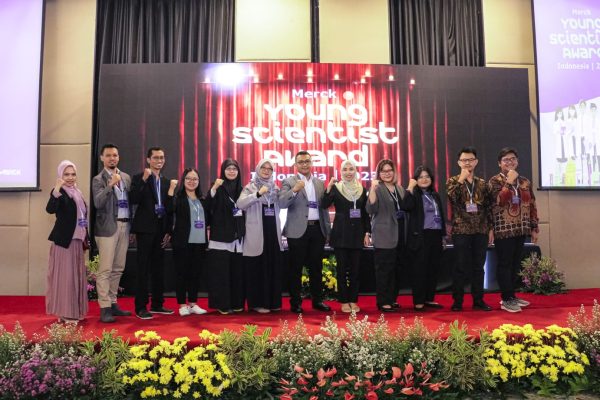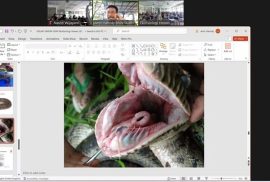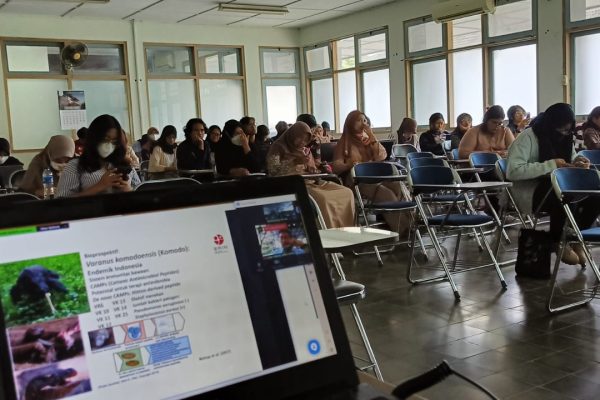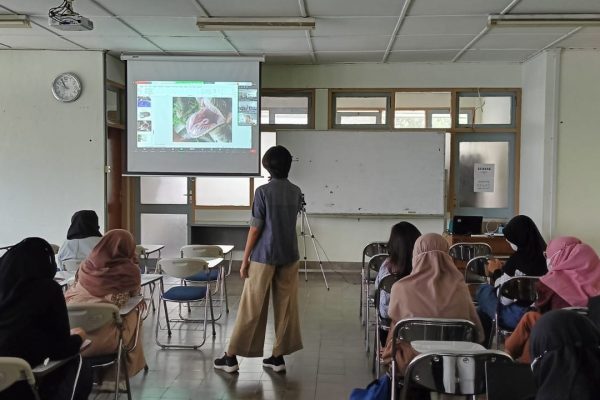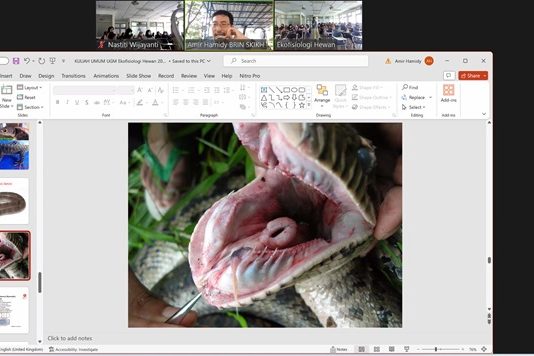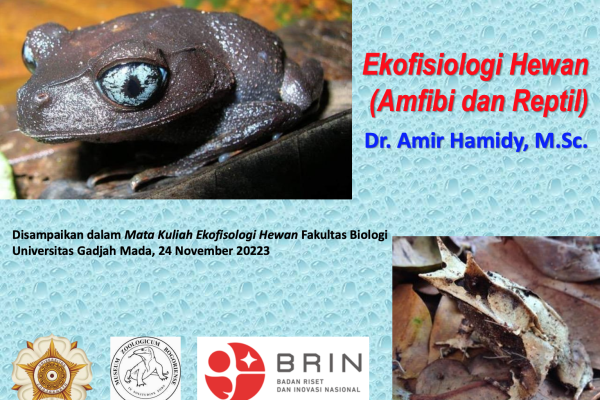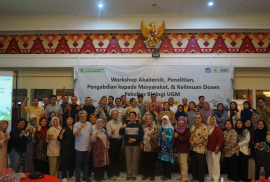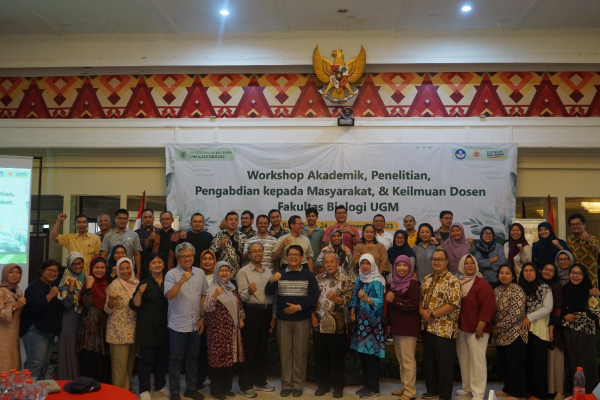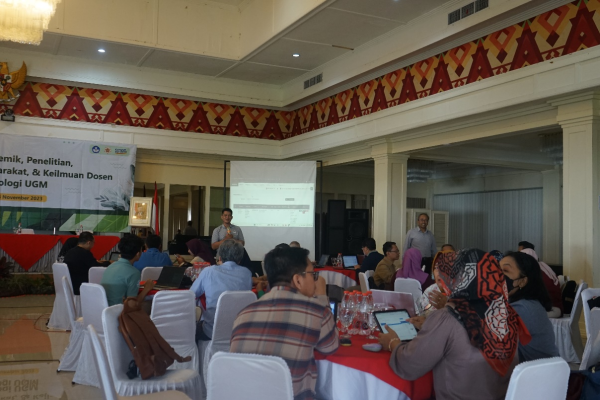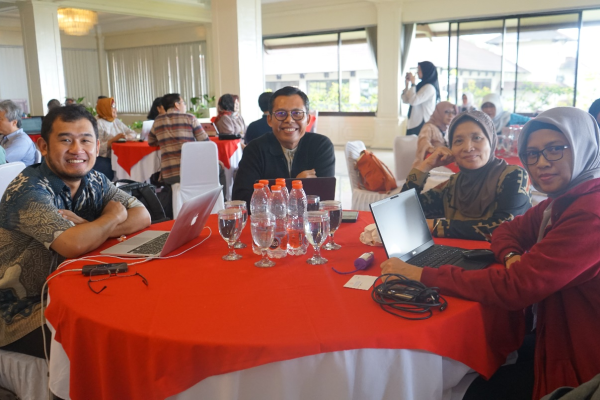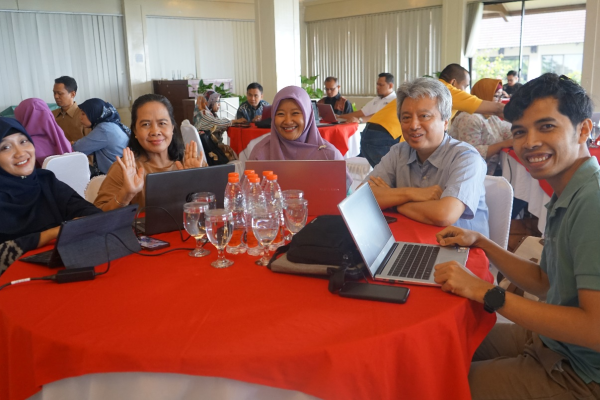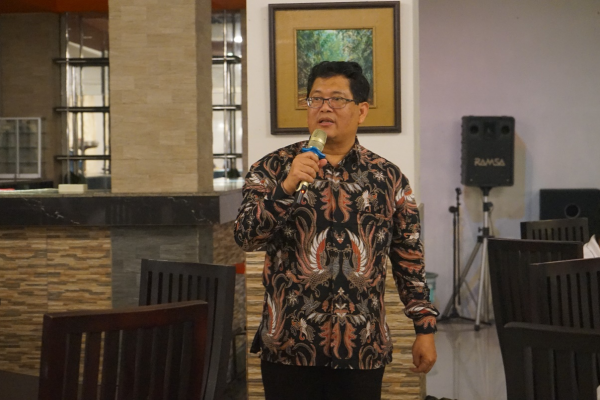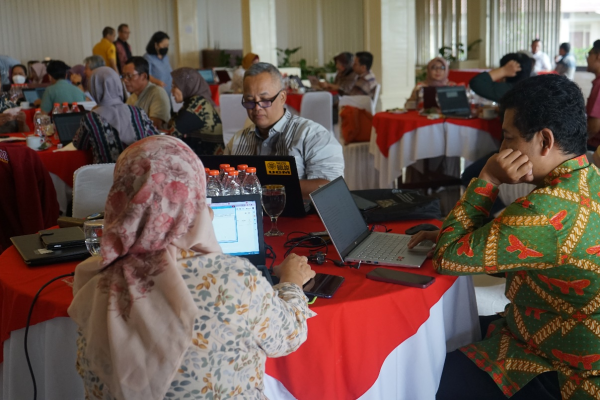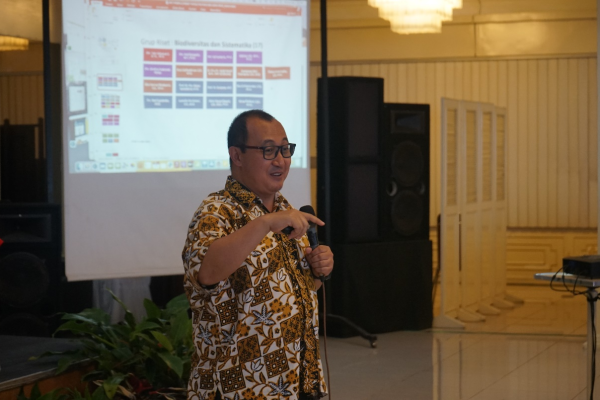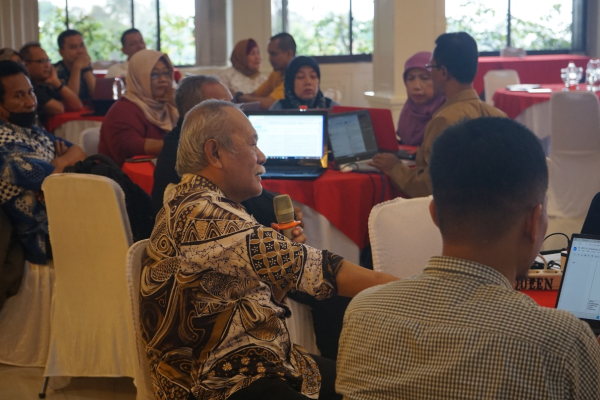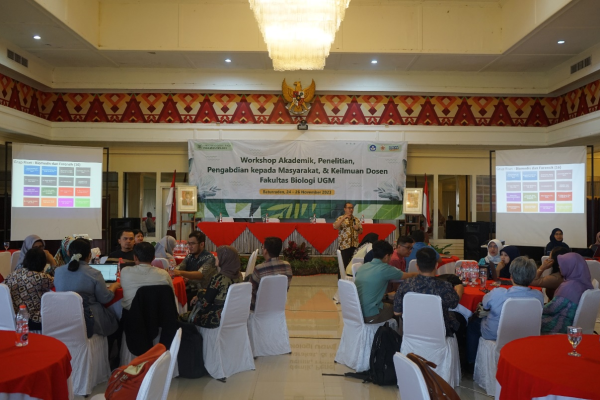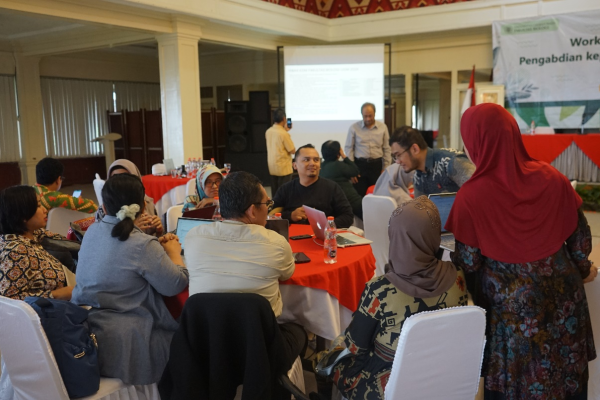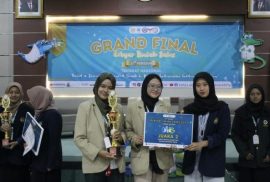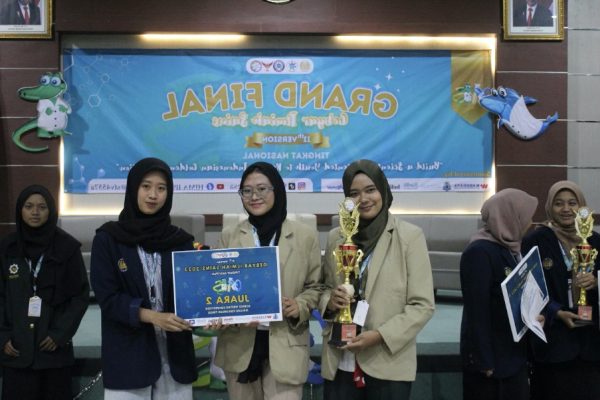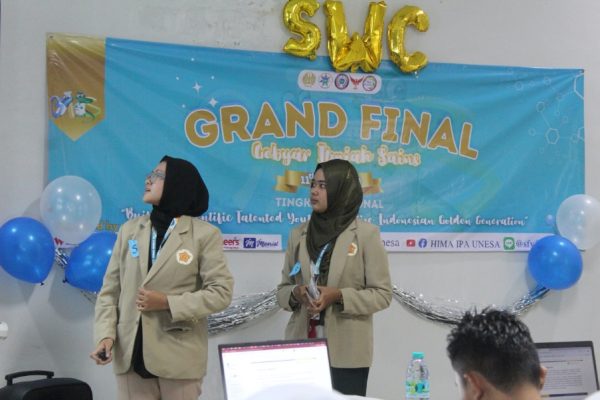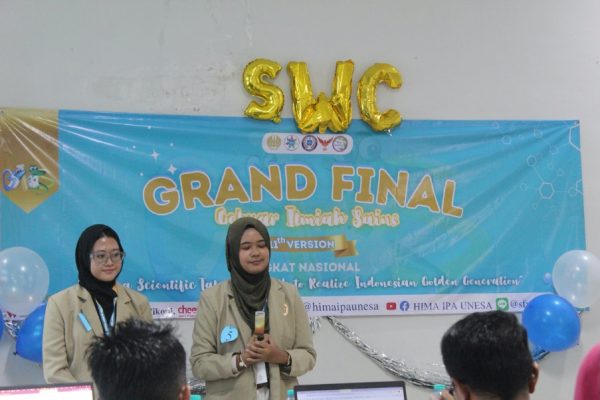Field Training is the culmination of the CAM XXVI Basic Training and Education series that has been conducted over the past few weeks. The purpose of this Field Training activity is to assess CAM XXVI based on the material they have received during the Basic Training and to officially induct the CAM (Prospective Young Members) as AM (Young Members). This event took place over two days and one night, from November 4th to 5th, 2023, at Mount Nglanggeran Ancient Volcano, Nglanggeran Village, Patuk District, Gunung Kidul Regency, in the Special Region of Yogyakarta. The activity was attended by 6 CAM XXVI participants, 6 AMs, and 7 senior members as the organizing committee, 5 Matalabiogama alumni as honorary members, and 1 lecturer serving as the Matalabiogama mentor.
The XXVI Field Training activity began with the arrival of CAM and the committee at 10:00 AM local time at Mount Nglanggeran Ancient Volcano. After a brief rest, the opening ceremony of the XXVI Field Training commenced, followed by a final assignment presentation given to CAM XXVI regarding activity planning, accompanied by a Q&A session. Subsequently, there was a rearrangement of bags to be carried during the nature exploration. In this exploration, CAM XXVI divided into two groups, embarked on a trek toward the summit of the ancient volcano, reaching 700 meters above sea level with four designated stopping points. During this activity, CAM members were tested on their understanding of caving equipment, case studies, first aid for accidents, and setting up a bivouac. The activities of the first day concluded with a group documentation at the peak of Mount Nglanggeran Ancient Volcano and the pitching of tents at the campsite.
On Sunday, November 5th, 2023, at 03:15 AM, CAM XXVI were awakened to participate in the induction ceremony as Young Members of Matalabiogama XXVI. On that day, six members were officially inducted: Muhammad Fazli Makatita, Naomi Zola Sebayang, Golda Theresia Simarmata, Husna Nadia, Geraldine Yara Amritarashmi, and Dharma Kiart Wijaya. Additionally, five members, Sulthon Fatih, Adrian Pradipto Harmawan, Rizal Alfarizan Ramadhan, Layla Oktavia, and Ikhlasul Amal, were conditionally inducted pending the fulfillment of specific requirements within the shortest possible time. The induction of young members involved a ceremonial sprinkling of flower water as a symbol of purification and the commencement of a new phase within Matalabiogama dynamics, followed by the wearing of scarves around their necks as a symbol of membership as Young Members of Matalabiogama Diklat XXVI.
Following the induction, there was a sharing session and breakfast with attending alumni. The XXVI Field Training activities concluded with a cleanup of the camping area and a documentation session. Subsequently, all participants and committee members of the Field Training returned to the Faculty of Biology, Gadjah Mada University. Vivat et Floreat!
UNITE is an International Conference program involving students from various prestigious universities worldwide. This activity is part of the ‘Rumah Kepemimpinan’, a self-development program for students in Indonesia. The conference aims to provide opportunities for youth to discuss, interpret the history of Islam, and create ideas that can enhance the impact on the environment with the spirit of Islamic civilization.
This year, UNITE took place from November 14th to 22nd, 2023, in Istanbul, Turkey, marking the second implementation of the program. This time, UNITE sent 7 student delegates from Indonesia representing various universities, including two from Universitas Gadjah Mada: Fathur Syahrian Ramadhani (Biology 2020) and Luthfia Nurul Atikah (International Relations 2019). Additionally, the conference was attended by student delegates from various countries such as Turkey, Yemen, Egypt, Morocco, Pakistan, Ethiopia, and Myanmar. These delegates were selected through a series of assessments including administrative tests, interviews, and project presentations.
Before the departure, Fathur underwent approximately 4 months of preparation, including Islamic historical insight, mentoring projects, team management, and fundraising. Each delegate prepared an ideas pitching session which was presented during the conference. The conference, held at the Turkish Youth Foundation (TÜGVA), an organization empowering youth to uphold justice and create various works worldwide, proceeded smoothly.
The activities commenced with seminars by three speakers: Mohammed Abdulhameed, Fatema Soliman, and Muhammad Anas. Each presented three distinct topics: “The Role of Youth as Innovators,” “Research as The Initial Gate to Innovate,” and “The Spring of Islamic Civilization.” Subsequently, the event continued with Focus Group Discussions (FGDs) among student delegates to discuss educational topics for youth worldwide.
From this conference, the three speakers also served as judges for the delegate projects, and Fathur received the “Best Presentation” award, while Luthfia received the “Best Social Project” award out of the three available awards.That achievement is a proud accomplishment for Universitas Gadjah Mada. “Participating in UNITE is something I am grateful for because of the various benefits, from learning through mentorship preparation, improving English speaking skills, engaging in discussions with international students, to studying the history of Islam at various historical sites in Turkey. Furthermore, with support from the delegates and judges, I am inspired to continue my project plan in the future,” said Fathur. Fathur himself brought an idea for a project he initiated back in 2021, called Hirau, a community of young people focused on advocating for environmental issues. These accomplishments were undoubtedly a result of support from the faculty, university, and those around him. [Author: Fathur Syahrian Ramadhani]
[MBKM-PkM] The Independent Learning Independent Campus (MBKM) Community Service Program team from the Faculty of Biology, UGM, led by Prof. Dr. Endah Retnaningrum, M.Eng., along with four students Avila Kusuma W, Daimeera Anja, Shanaz Dhiya’ul Haq, and Syahidina has been conducting socialization and mentoring sessions with “Shobaru” livestock farmers in Condong Catur Village, Sleman, Yogyakarta, from October to November 2023.
The mentoring aimed to improve the quality of the local chicken eggs through the provision of fermented feed. The quality of these eggs is enhanced compared to those from non-fermented feed. The local chicken eggs have a richer taste and a stronger yolk color due to their high β-carotene content. This improvement is attributed to the higher nutritional content and better digestibility of fermented feed for the poultry. Moreover, providing fermented feed increases the animals’ appetite while reducing the odor from their waste. Additionally, fermented feed serves as a cost-effective alternative to commercial feed, which tends to be more expensive. The team also conducted socialization and mentoring on branding and online marketing of the local chicken eggs through social media platforms, including guidance on managing social media accounts. Packaging the local chicken eggs with branding has expanded their market reach, allowing consumers to locate and contact the local chicken egg farmers, thereby increasing the product’s visibility.
Through the MBKM Community Service activities by the Faculty of Biology, UGM, the “Shobaru” livestock farmers have seen improvements in both the quality of their egg products and their marketing strategies. This has led to sustained economic prosperity for the community while also contributing to environmental preservation.
The Dean of the Faculty of Biology UGM and also the chairman of the Indonesian Biology Consortium (KOBI), Prof. Dr. Budi Setiadi Daryono, M.Agr.Sc., attended the National Work Meeting (Rakernas) of the Indonesian Biology Consortium (KOBI) on November 29-30, 2023, at the School of Life Sciences and Technology (SITH) Institut Teknologi Bandung (ITB). This Rakernas was attended by 108 participants from various study programs such as Biology, Biology Education, Biotechnology, Microbiology, and Applied Biology across Indonesia.The other representatives from the Faculty of Biology UGM were also present: the Vice Dean for Academic and Student Affairs, Dr. Bambang Retnoaji, M.Sc., Sukirno, S.Si., M.Sc., Ph.D. the head of Bachelor in Biology Study Program, Dr. rer. nat. Andhika Puspito Nugroho, S.Si., M.Si., the head of Master in Biology Study Program and Abdul Razaq Chasani, S.Si., M.Si., Ph.D., the head of the Tropical Biology Department.
The event commenced with an address by Prof. Dr. Budi Setiadi Daryono, M.Agr.Sc., as the KOBI chairman, emphasizing the pivotal role of KOBI in enhancing quality assurance and elucidating the sustainability of biology as a fundamental discipline in Indonesia. Subsequently, the event was officially opened by the Dean of SITH ITB, Dr. Endah Sulistyawati, S.Si., Ph.D. The Rakernas KOBI spanned two days, focusing on five main topics and workshops guided by competent speakers on the first day. The second day involved workshops and served as the culmination of the Rakernas.
Various topics were covered during the event, ranging from strengthening the Biology cluster to influencing public policy formulation in legislative institutions to botanical illustrations in scientific activities. Additionally, there were presentations on Biology education at the high school level and a Teacher Program implemented through Lecturers Teaching at high schools. One of the crucial sessions was the fourth presentation delivered by Dr. Slamet Widiyanto, S.Si., M.Sc., a lecturer from Faculty of Biology UGM, on the topic of the National Work Competency Standards (SKKNI) for Biological Curators. This session discussed the SKKNI for the job positions of Curators of Herbarium/Animal/Microorganism Collections, aiming to assist in human resource management in both governmental and non-governmental institutions to ensure that the existing workforce possesses competencies aligned with nationally applicable standards. The event continued with the final presentation on the Renewal of the Indonesian Biodiversity Index Database (IBI) through the Biological Data Curator Student Activities (MKDH) in 2024, delivered by Oki Hadian Hadadi, M.Sc. from WWF Indonesia. The first day of the Rakernas concluded with a workshop on the Development and Completion of Outcome-Based Education (OBE) and the Independent Learning Independent Campus (MBKM) Curriculum Template, led by Prof. Dr. Budi Setiadi Daryono, M.Agr.Sc., Dr. Indra Wibowo, M.Sc., and Dr. Rodiyati Azrianingsih, M.Sc., as speakers. This workshop aided participants in analyzing OBE curricula for their respective study programs.
Furthermore, the second day was dedicated to a Workshop on Completing the Lamsama Accreditation Form, which served as the anticipated highlight for participants managing their respective study programs. This workshop was led by Prof. Dr. Tati Suryati Syamsudin, M.S., DEA., and Prof. Dr. Diah Rachmawati, M.Si. as speakers.
The KOBI Rakernas wasn’t just a knowledge exchange forum but also emphasized KOBI’s commitment to supporting the achievement of Sustainable Development Goals (SDGs), particularly enhancing inclusive education (SDG 4) through sustainable collaborations (SDG 17). Therefore, the KOBI Rakernas aimed to strengthen collaboration among its members and support Indonesia’s biodiversity towards achieving sustainable development.
Yogyakarta, 30 November 2023 – The Research Days 2023 were successfully held involving dozens of researchs, publications and community service titles as well as downstream products from the academic community of Faculty of Biology UGM. The annual agenda of the Faculty of Biology UGM was closed by Dr. Eko Agus Suyono, M.App.Sc. as Vice Dean for Research, Community Service, Collaboration and Alumni Affairs located in the hallway of Building B, Faculty of Biology.
Research Days will be held for 2 days, 29 and 30 November 2023 in the form of a poster exhibition of research results, publications, community service, and downstream products from collaboration between lecturers and students of the Faculty of Biology. This activity also serves as a forum for sharing between lecturers and students to increase collaboration and partnerships. During the two days of the exhibition, visitors can participate in voting for the best poster of their choice. Downstream products that were exhibited and sold also invited appreciation from visitors, including terrariums, microalgae research products, orchid culture seeds, and so on.
“Through these Research Days, it is hoped that new ideas and collaboration will emerge between students and lecturers,” said Dr. Eko in his speech at the closing of Research Days 2023, Thursday (30/11) afternoon. He also added his appreciation to the students who were enthusiastic during Research Days with comments about the very diverse student interest in research at the Faculty of Biology.
At the end of the event, the winner of the best poster in the Research Poster and Community Service Poster categories was also announced. In the research poster category, achieved by poster form Prof. Dr. Kumala Dewi M.Sc.St., Dr.med.vet. drh. Hendry T.S.S.G. Saragih, M.P., and Dr. Ardaning Nuriliani, S.Si., M.Kes. Meanwhile, for the community service category were achieved by posters from Laksmindra Fitria, S.Si., M.Si., Dwi Umi Siswanti, S.Si., M.Sc., and Dr. Dwi Sendi Priyono, S.Si., M.Si. Dr. Eko as Vice Dean for Research, Community Service, Collaboration and Alumni Affairs gave his appreciation for the prizes to the winners.
It is hoped that Research Days will trigger the enthusiasm of the Biology Faculty academic community in increasing research, publications and community service activities, in accordance with the commitment to support the Sustainable Development Goals (SDGs), especially in improving inclusive education (SDG 4) through sustainable collaboration (SDG 17).See you at Research Days 2024!
Yogyakarta, 29 November 2023 – Research Day 2023 is officially opened. This activity is part of the Faculty of Biology’s commitment to implementing the tri dharma of higher education, especially research, publication and community service as well as supporting the Sustainable Development Goals through research results and publications by the academic community. The annual agenda of the Faculty of Biology UGM this time was held in the hall of Building B, Faculty of Biology, and was attended by the Director of Research Universitas Gadjah Mada, Prof. Dr. Mirwan Ushada, STP, M.App.Life.Sc., Vice Dean for Research, Community Service, Collaboration and Alumni Affairs Faculty of Biology, Dr. Eko Agus Suyono, M.App.Sc., as well as all lecturers and students of the Faculty of Biology.
“This activity is carried out as a forum for sharing research and community service activities between lecturers and students as well as establishing partnerships,” said Dr. Eko in his speech Wednesday (29/11). He also conveyed the need for joint synergy to collaborate with foreign partners in increasing the recognition of the QS World University Ranking in terms of research and publications with foreign partners. Dr. Eko also reported that the number of participants in the 2023’ Research Days was 59 research posters, 17 community service posters, 7 posters from partners and 8 products downstream from Faculty of Biology lecturers and partners.
“Research day is expected to be a means of sharing between laboratories, between lecturers, and between students and partners so as to provide support for students to view research and publication as passion, not pressure,” said Prof. Mirwan in his speech. He also conveyed a message from the Vice Chancellor for Education and Learning of Universitas Gadjah Mada, Prof. Dr. Wening Udasmoro, SS, M.Hum., DEA, regarding the big role of the Faculty of Biology in implementing SDGs points through research, publications and service activities which are expected to benefit the wider community. Next, Prof. Mirwan officially opened the Faculty of Biology’s Research Day agenda this year.
Students said they were enthusiastic about participating in Research Days. Various results of their research and community service together with Faculty of Biology lecturers were exhibited in Building B of the faculty for 2 days, 29 and 30 November 2023. Participants and visitors can vote to choose the poster they like and the winner will be announced at the end of the event.
It is hoped that Research Days will trigger the enthusiasm of the Biology Faculty academic community in increasing research, publications and community service activities, in line with support for improving inclusive education (SDG 4) through sustainable collaboration (SDG 17).
In anticipation of Indonesia Emas 2045, it’s crucial to prepare a high-quality, competent, and competitive young generation. Encouraging active innovation and research in the fields of science and technology among the youth is a step towards this goal. Support from the government, private sector, and other stakeholders is essential, involving substantial research funding incentives, downstreaming research products, and recognizing successful young researchers or scientists.
Merck, a leading science and technology company, hosted the Merck Young Scientist Award (“MYSA”) on November 23, 2023, at Hotel ASTON Priority Simatupang Hotel & Conference Center in Jakarta. This award for young researchers has been held since 2018 and occurs every two years. This time, the organizing committee successfully selected 136 young researcher candidates from across Indonesia. Out of these candidates, 12 of the best young researchers were chosen to participate in the award event in Jakarta. The participants underwent rigorous selection by a panel of judges chaired by Prof. Dr. Apt. Edy Meiyanto, M.Si., from Universitas Gadjah Mada. Other jury members included Prof. Dr. Taufiqu Rohman, M.Eng., from the National Research and Innovation Agency (BRIN); Iman Hidayat, Ph.D., from BRIN; Dr. Riza Arief Putranto, D.E.A., from The Indonesian Society for Bioinformatics and Biodiversity; and Ilma Equilibrina, Ph.D., from PT Merck. Those who made it to Jakarta went through another selection phase, presenting scientific posters and research findings. Among the 12 selected candidates in Jakarta was Sigit Dwi Maryanto, representing the Faculty of Biology, Universitas Gadjah Mada. In this opportunity, Sigit aimed to showcase his best in front of the jury and researchers from across Indonesia. Sigit presented an innovative research on the efficiency of fertilizing oil palm plants using a molecular marker-based plant breeding approach. The ultimate aim of this research was to produce “Efficient Nutrient Superior Oil Palm” plants, which could potentially enhance the welfare of Indonesian oil palm farmers, aligning with the SDGs 2030 through science and technology. However, the jury named the best researcher as Dr. Eng. Sjaikhurrijal El M., S.Si., M.Eng., from BRIN, awarding him a prize of IDR 50,000,000.
Devy Tri Nurmala, the Head of the Merck Young Scientist Award (“MYSA”) Committee, expressed appreciation to the 12 best candidates who participated in MYSA. She expressed hope that young researchers would continue their work, generating research products beneficial for the nation’s progress.
On Friday, November 17th and Friday, November 24th, 2023, a Guest Lecture on Animal Ecophysiology was conducted online through a Zoom meeting. The Animal Ecophysiology course is a compulsory course in the functional interest field (animals), taught by professors in the Animal Physiology Laboratory. Dr. Amir Hamidy, M.Sc., an alumnus of the Faculty of Biology UGM, participated as the speaker. Currently, Dr. Amir Hamidy, M.Sc. works as a Senior Researcher at the National Research and Innovation Agency (BRIN) and holds the position of Director of the Secretariat for Biological Diversity Authority at BRIN. During the first session, Dr. Amir Hamidy discussed topics related to the eco-physiology of amphibians and reptiles in Indonesia. The explanation aimed to provide insights to students in both Regular and IUP classes regarding the research field pursued by Dr. Amir Hamidy. After the presentation, a discussion and Q&A session took place. The students actively participated by asking questions and discussing various aspects presented by the speaker. This discussion provided students with the opportunity to clarify and deeper understanding of the topics discussed.In the second session, government policies related to the utilization of genetic resources for animal research, analysis of opportunities and challenges in animal ecophysiology research, and procedures for obtaining research permits for wild and protected animals in Indonesia were explained.
This Guest Lecture provided students with profound insights into the biodiversity richness in Indonesia and the potential research that can be conducted in the field of animal ecophysiology. Moreover, it facilitated interaction between students and experts, aiming to open opportunities for future knowledge development and collaborations. As a follow-up, there’s an expectation for further activities or in-depth workshops related to the presented material. This could offer students opportunities for deeper engagement in research and application of animal eco-physiology concepts in real-world contexts. In its implementation, this initiative is also expected to support Sustainable Development Goal (SDG) number 15 (Life on Land), which focuses on the protection and conservation of terrestrial biodiversity.
November 24-26, 2023 – The Faculty of Biology at Universitas Gadjah Mada (UGM) organized an Academic, Research, Community Service, and Scientific Expertise Workshop. The event took place at Queen Garden Hotel, Baturraden, Purwokerto, Central Java, and was attended by all faculty members of the Faculty of Biology at UGM.
After a 5 to 6-hour journey from Yogyakarta, the group arrived in Baturraden, and the official activities were inaugurated by Prof. Dr. Budi Setiadi Daryono, M.Agr.Sc., the Dean of the Faculty of Biology at UGM. Prof. Budi expressed, “This workshop serves as a highly beneficial platform for the academic development and enhancement of the quality of the Faculty of Biology’s lecturers. We hope that this activity can contribute positively to the advancement of knowledge and teaching in the field of biology and will be filled with discussions related to academics, research, community service, and the scientific expertise of the Faculty of Biology.”
On Saturday morning (11/25), the workshop began with an explanation of the OBA Simaster portfolio presented by Dr. Bambang Retnoaji, M.Sc., the Vice Dean for Academic and Student Affairs. Subsequently, Dr.rer.nat. Andhika Puspito Nugroho, M.Si., the Head of the Master’s Program at the Faculty of Biology, guided the completion of the OBA Simaster for faculty members in the Simaster system. OBA Simaster is an instrument prepared to measure Outcome-Based Learning (OBE) at UGM. The implementation of OBE is UGM’s effort to address the challenges of education in the era of Industry 4.0. OBA Simaster will serve as a facility for program managers and lecturers to process learning outcomes in accordance with the Semester Learning Program Plan (RPKPS). This workshop, organized by the Faculty of Biology, aims to assist faculty members in uploading and synchronizing portfolios in OBA Simaster.
The workshop continued with discussions on research and community service presented by Dr. Eko Agus Suyono, M.App.Sc., the Vice Dean for Research, Community Service, Cooperation, and Alumni. Dr. Eko provided information about the research and publications of Faculty of Biology lecturers, including the number of research projects, external and internal grant funding sources, research partners, and the latest information on the scopus index for Faculty of Biology lecturers. Dr. Eko emphasized the importance of collaboration in efforts to increase the number of research projects and publications, both among faculty members and with external partners, both domestically and internationally. The workshop also discussed the initiation of research group formation and the selection of villages supported by the Faculty of Biology at UGM. These research groups are expected to serve as a collaborative platform for research publications to enhance the quality and quantity of faculty research and publications.
The faculty mapping of expertise was presented by Abdul Razaq Chasani, Ph.D., the Head of the Tropical Biology Department, along with the analysis of the expertise of faculty members in each laboratory at the Faculty of Biology at UGM. Mr. Razaq mentioned that there are many intersections of interests and research topics among faculty members from different laboratories. This clearly indicates the potential for collaboration among laboratories to enhance the capacity and quality of faculty members in each laboratory.
This workshop is expected to serve as a bridge for the improvement of Human Resources quality, especially for Faculty of Biology lecturers, in implementing the three pillars of higher education. In addition, the activity is also part of the Faculty of Biology’s commitment to supporting the Sustainable Development Goals (SDGs), particularly inclusive education (SDG 4) and collaboration among faculty members (SDG 17) to enhance the quality and quantity of teaching, research, publications, and community service.
Biology undergraduate student team from the Faculty of Biology UGM class of 2022 namely Nur Farah Susilowati and Iqlima Safitri have achieved the second place in The Science Writing Competition “ Gebyar Ilmiah Science (GIS) 11th version 2023 held by Faculty of Mathematics and Natural Science Surabaya State University with the final presentation held on October 15, 2023. The team took sum theme etnosains with the title “Local Wisdom as Action Means: Adapting Mane’e and Eha Traditions in North Sulawesi to Reduce Exploitation of Marine Natural Resources,” addressed the exploitation of marine ecosystems, particularly the excessive and environmentally unfriendly exploitation of marine resources. This exploitation often leads to habitat degradation and supports the extinction of species. Their scientific paper was aimed to analyze the utilization of the Eha and Mane’e traditions in addressing exploitation in South Sulawesi. Their goal was to adapt these traditions into other fishing methods and make them effective instruments in dealing with exploitation while integrating traditional knowledge and modern policies into a sustainable approach. Their intention was to aid in preserving the natural environment and strengthening community well-being.
Their scientific paper was composed using a literature review approach aimed to analyze the topic and issues through a descriptive case study analysis. The Mane’e and Eha traditions highly uphold prohibitions against exploitation by considering harvest seasons and using simple fishing tools called Sam’mi. Involving the community in utilizing the Mane’e and Eha traditions not only preserves local wisdom but also ensures the sustainability of natural resources for future generations. The collaboration between the government, community, and other relevant stakeholders is crucial to ensure the effective and sustainable implementation of these traditions in supporting the quality and yield of natural resources. [Authors: Nur Farah Susilowati, Iqlima Safitri]

